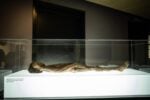Alessandro Imbriaco – The Garden
.jpg)
Da circa cinque anni mi occupo attraverso il mio lavoro fotografico di documentare il disagio abitativo nella città di Roma, il che mi ha portato a esplorare in modo sempre più capillare quelle zone marginali e nascoste all’interno del territorio urbanizzato della città che, grazie alla loro natura liminale, sono cresciute a ridosso della speculazione edilizia creando quasi delle roccaforti autarchiche di sopravvivenza. “Il Giardino” è una di queste zone.
Comunicato stampa
de
Seit etwa fünf Jahren dokumentiere ich in meiner fotografischen Arbeit das Wohnproblem der Stadt Rom, was mich dazu gebracht hat, die Randzonen und die versteckten Orte innerhalb des urbanisierten Territoriums der Stadt immer flächendeckender zu erforschen. Durch ihre Grenznatur sind diese Orte in unmittelbarer Nähe von Objekten der Bauspekulation entstanden und bilden quasi autarke Hochburgen des Überlebens.
„Der Garten“ ist eines dieser Gebiete. Es handelt sich um einen Sumpf neben dem Fluss Aniene, der unterhalb einer stark befahrenen Straßenbrücke in der östlichen Peripherie Roms liegt. Diverse Versuche, das Sumpfgebiet zum Erhalt seiner besonderen Fauna unter Schutz zu stellen, scheiterten. Komplett verlassen beherbergt es nun neue Formen von Leben: Angela, ein sechsjähriges Mädchen ist hier geboren und aufgewachsen. Sie lebt mit ihren Eltern, Piero aus Sizilien und Luba aus Russland, in einer versteckten Baracke unter der Straßenüberführung.
„Der Garten“ erzählt von den Orten und der Atmosphäre in denen das Mädchen bis heute gelebt hat und auch von der gewandelten Funktion dieses Gebietes, die nicht mehr nur Fasane oder Teichhühner schützt, sondern auch Menschen, die an diesem Moor einen sicheren Unterschlupf gefunden haben, sowie eine alternative Lebensform, die für diejenigen, die täglich mit dem Auto die Brücke überqueren, fast unvorstellbar ist.
Alessandro Imbriaco
it
Da circa cinque anni mi occupo attraverso il mio lavoro fotografico di documentare il disagio abitativo nella città di Roma, il che mi ha portato a esplorare in modo sempre più capillare quelle zone marginali e nascoste all’interno del territorio urbanizzato della città che, grazie alla loro natura liminale, sono cresciute a ridosso della speculazione edilizia creando quasi delle roccaforti autarchiche di sopravvivenza.
“Il Giardino” è una di queste zone. In realtà si tratta di una piccola palude dell’Aniene, situata sotto un cavalcavia molto trafficato nella periferia est di Roma, una zona che nel tempo è stata sottoposta a vari tentativi di tutela ambientale per preservare la sua fauna specifica, e che poi – del tutto abbandonata – si è trovata a preservare altre forme di vita. È qui, infatti, dove è nata e cresciuta Angela, una bambina di sei anni che vive insieme ai suoi genitori: Piero (siciliano) e Luba (Russa) in una baracca nascosta sotto al cavalcavia.
„Il Giardino“ racconta sia i luoghi e le atmosfere dove la bambina è vissuta fino ad all’ ora, sia la mutata funzione di questa zona che non protegge più fagiani o gallinelle d’acqua, ma anche le persone che in questo pezzo di terra hanno trovato un rifugio sicuro, nonché un’alternativa di vita quasi inimmaginabile per chi tutti i giorni passa in macchina sopra quel cavalcavia.
Alessandro Imbriaco
en
Over the last five years I have been working on the housing problem in the city of Rome, which brought me to explore thoroughly the peripheral and hidden spaces within the city's urban tissue. Due to their liminal nature, those places grew next to areas of huge urban speculation, almost standing as autarchic strongholds of survival.
“The Garden” is one of those places. It is a small swamp next to the Aniene River, under a flyover of the ring road in the eastern outskirts of Rome. The swamp was considered a zone to be protected for its particular fauna (birds and foxes), but all the attempts to make it a game reserve failed because it was abandoned and left with no environmental protection. But this zone ended up protecting other living creatures: Angela, a six-year-old child, was born here and grew up here with her parents Piero, from Sicily, and Luba, from Russia, in a shack under the flyover.
“The Garden” tells the places and the atmospheres in which Angela lived and the new function of this failed experiment of game reserve, which doesn’t protect only birds and foxes but also the people who live there, and who found in the swamp a safe shelter, hidden from the rest of the city – a different kind of existence, unimaginable for all the people driving every day on that flyover which separates this invisible world from the rest of the city.
Alessandro Imbriaco



